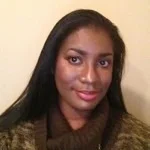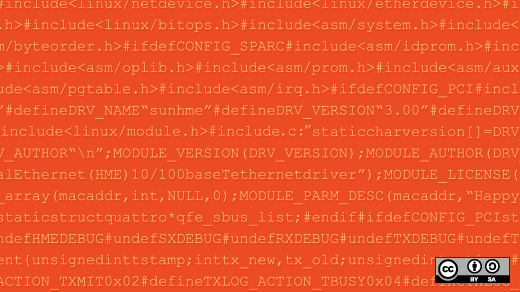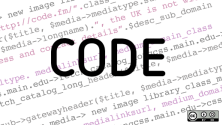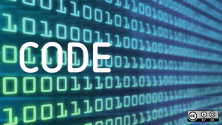When I heard Erica Stanley speak about women in open source at All Things Open last fall, I knew I wanted to hear more. When the opportunity to interview her arose last month, I jumped at the chance.
 What impressed me about Erica then was that she, like me, was someone who loved both art and science. She spoke of how, relying on the advice of her father to pick a practical career, she was able to wed her love of creative arts and computer science. Erica is the founder of Women Who Code in Atlanta, Georgia. As an educator who is interested in helping young women find careers in technology, that was another point of congruence for us.
What impressed me about Erica then was that she, like me, was someone who loved both art and science. She spoke of how, relying on the advice of her father to pick a practical career, she was able to wed her love of creative arts and computer science. Erica is the founder of Women Who Code in Atlanta, Georgia. As an educator who is interested in helping young women find careers in technology, that was another point of congruence for us.
In this interview, Erica shares the importance of mentoring and diversity in her career, and why it should be important to everyone going forward. She also touches on how the Internet of Things (IoT) is developing and evolving, and she gives us a sneak peek of her talk at POSSCON 2015.

Tell us about yourself.
I got started in technology fairly young. I started coding in high school. Even though I went to a fine arts high school and a lot of people at the time felt the arts and STEM didn't mix, I found them complimentary. Eventually, my Dad gave me what I call the "be practical" talk, hoping I'd leave art behind and choose a more financially stable career path. I decided he had a point, but that it didn't mean I couldn't do both.
I went to on receive my BS and MS in computer science from Clark Atlanta University, specializing in graphics and visualization. I continued on that path for a few more years, conducting research in graphics, visualization, and telepresence at the University of North Carolina. From there, I went on to work at some great companies and startups, including Boeing, FOX Interactive Media, Turner Broadcasting, and Oracle.
Now, I am an independent software developer and entrepreneur working with the software consulting company I founded in 2010, Acire Studios, and a host of other projects.
How did you get started in open source?
I started getting involved with open source as a Computer Science (CS) grad student. I was using a combination of open source and proprietary software in my research. Given the nature of research, being able to rapidly prototype a concept and customize the tools involved are both hugely important goals. I found that open source tools often gave our team this win-win scenario where we were able to quickly try a variety of tools at no cost while also being empowered to modify or even combine solutions. This was a big advantage over using closed proprietary software.
But possibly the biggest advantage that open source projects often had over the proprietary offerings was the vibrant communities that began to spring up around a particular tool or library. Those communities provided a wealth of information and an exchange of ideas that's invaluable when you're working with emerging technologies.
You say you are an interactive developer who loves to solve tough problems in creative ways. Can you give us some examples of your favorite projects?
I have lot of fun projects to pull from, but I think my favorite is probably a project I worked on while at Boeing. I worked on a 3D simulation of space shuttle trajectory at Kennedy Space Center. It was an interesting problem in that we had to take these mathematical models and convert them into algorithms that would predict the trajectory under different weather conditions. But as someone who at one point wanted to be an astronaut, it was my own little nerd nirvana to be able to work with the space shuttle, even if it was way behind the scenes.
I've worked with a lot of projects involving gaming and social media. Gaming is already an interesting problem set. Along with the technical challenges, you're also always looking for a way to make the experience more engaging for the user. When you incorporate social media, you're not just looking at how to engage the individual, but how groups of people will interact with your game and each other. And you start thinking of ways to enhance and simulate that natural interaction in the game play. That intersection of computer science and social science is really interesting to me.
You are one of the founders of Women Who Code in Atlanta. How important is it to you that other women find careers in technology?
There are so many reasons we all should want more women in technology careers. It's important as a means of empowering 51% of our population nationally, but it's also extremely important for the tech industry. During the Women in Open Source panel at All Things Open last year, someone asked why diversity in tech was important. My response was, "If you're building products and solutions for people, then you need diversity in your product teams." If you're trying to find traction with a wider demographic, then you need the perspective and ideas everyone can bring to the table—including women, including minorities.
Also, we are running into a shortage of technically skilled workers to fill the ever-increasing thousands of technical jobs available. By 2020, we will have 1 million more tech jobs than computer science graduates. That's less than five years away. To fill this need, we'll have to do some things differently than we have in the past. You don't solve problems by doing things the way you've always done them. We'll have to find ways to appeal to women and minorities to bring more people, perspective, and ideas to tech. Working with Women Who Code has allowed me to address these issues locally and help get companies and organizations within the Atlanta tech community involved in changing our approach to diversity.
What advice can you offer to young women who are looking to get involved in technology?
Go for it! There might be people who would try to convince you otherwise, but don't let other people dictate your potential and your career. Also, the cool thing about technology is it touches almost every facet of our lives now. Find that thing that you love, that you geek out about. Now find the intersection of that passion and technology and let that guide your career.
How important was mentoring in your own career?
Extremely important. My career would likely have been very different if not for the subtle—and at times, not so subtle—guidance from mentors and teachers. I was interested in technology early, but growing up I had no idea how to turn it into a career, or even if I wanted to turn it into a career. I wanted to be something different every day. Slightly off topic, that's one of the things I love about working in tech. It's allowed me to solve problems and concept solutions in vastly different areas, so things are never boring.
As for mentoring, it started with teachers and mentors guiding me toward math and science—and later, technology—when they saw interest and aptitude. Later, professors and colleagues would introduce me to people whose work or research they knew I admired. Then I began to take a more active role, finding people who were doing things I wanted to do 3, 5, 10 years down the road and making those connections and asking questions.
What advice can you offer to women who are looking for mentors or mentees?
Be proactive, whether you're looking for mentors or mentees. I wish I had started actively looking for mentors so much earlier in my career. As a mentee, you might start by looking for someone who has been where you'd like to go. Think of those questions you have in getting from where you are to where you'd like to be. Find similarities in your backgrounds and career goals and start the conversation from there.
As a mentor, I've noticed mentees can be hesitant to approach a potential mentor. And also, depending on how new a mentee is in her career, she may not even know the right questions ask to resolve an issue or learn more about a new technology. So as a mentor, it can become an exercise of pulling information, at least in the beginning, to arrive at those epiphanies that could change the course of her career.
You're going to be talking about open source and the Internet of Things at POSSCON. You have a great deal of experience in that field. What advice do you have for developers who would like to follow your lead?
Jump in! It's a bit of a free-for-all now, which means things can be a little chaotic as a new developer in the space. While the foundational technologies have been around for decades, combining those building blocks in the consumer market is very new territory. That also means this is a great time to learn and get your feet wet.
There are so many extremely affordable open source tools—both hardware and software—out there to get you started with prototyping, from various Arduino boards to MetaWear to Tessel. You'll want to have a good understanding of programming in general, but especially programming for mobile devices. You'll want to have some knowledge of hardware, but honestly some boards, especially Tessel and MetaWear, make hardware prototyping extremely accessible for software developers.
Can you give us a "sneak peek" of your talk at POSSCON 2015?
Sure. I'll give an intro to the Internet of Things and some of the possibilities within the space. I'll discuss some of the underlying technologies and areas of interest, including product design, BLE, computer vision, data science, product design, and security. I'll also talk about how to prototype for IoT and the options available to developers and designers.
What about IoT really excites you?
The possibilities and, again, that intersection of social science and emerging technology. I remember when the Internet was this new thing, and even though at the time we weren't scratching the surface of its capabilities, it felt like the world was completely open to you. It feels like that again with IoT.
Where do you see IoT headed short term? Longer term?
I think it will probably be a lot like mobile was in the beginning, though IoT seems to be growing at an even faster rate. In the short term, I see a lot of issues with securing the vast amounts of personal data IoT will expose. I also see a need to turn all that data into meaningful stories, so data science will play a huge part in making these technologies useful in our everyday lives. Usability will become even more important as we move away from screens as our most common interface.
In the long term, I see security and privacy as ongoing issues. I also see the possibility of augmented reality through physically enhancing our bodies with ubiquitous technology. For instance, allowing the blind to see using computer vision enhanced contacts, or the deaf to hear with audible enhancement, or injecting devices that constantly monitor health factors and risks, and having all these devices connect with the network of devices in our home and in our cars. I think it will take a long time for society as a whole to be comfortable with that idea, but I think that's where we're heading 30, 50 years from now.
You are active on social media. How has that helped you as a developer, and what experience and advice do you have for others who are considering using social media to advance their careers?
Social media allows you to continue the conversation, and it definitely helps to expose you to new ideas related to your interests. That's extremely important in technology, when things can change drastically in days, not years. It's also great for reaching outside your local network. It means you can engage a global client base without having 20+ offices around the world.
Speaker Interview
This article is part of the Speaker Interview Series for POSSCON 2015. The Palmetto Open Source Conference is a technical conference focused on open technology and the open web. POSSCON takes place in Columbia, SC from April 14-15, 2015.







Comments are closed.